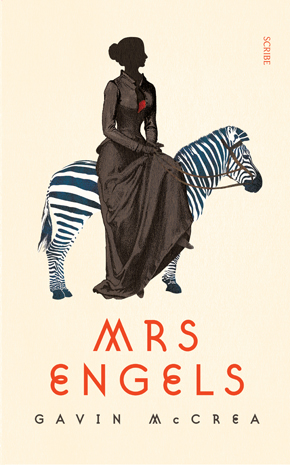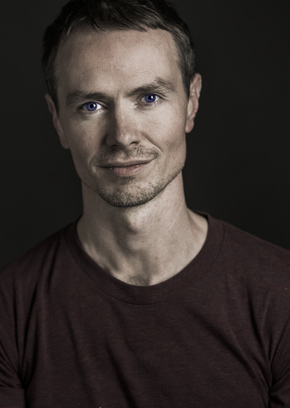Mrs Engels and me
by Gavin McCrea
“A terrific, startling read.” Rachel Holmes
Before writing my first novel, I had some very clear ideas about the kind of book it wasn’t going to be. It wasn’t going to be a) extensively researched (because ‘research destroys art’), b) set in the distant past (because ‘now’ is what’s interesting), or c) about The Woman Behind The Man (because that’s beyond banal).
Of course, then, as if to expose my arrogance, that’s precisely what it ended up being. Mrs Engels, the book I’m now proud to call my debut, is a) the result of a great deal research, b) set in the 19th century, and c) about the lover of a famous political scientist. Which makes me think that, as a writer, what I reject most vigorously might actually be what I most want. Next time, when my mind says, “No, not that! Anything but that!” I’ll save myself the anguish and just go there, to the fearful thing, and embrace it.
Now, was that so bad?
I came across Lizzie Burns in Tristram Hunt’s biography of Friedrich Engels. It was a chance meeting. Indeed, it was barely a meeting at all. Lizzie was illiterate and left no diaries or letters of her own, so there isn’t much known about her. A ghost in the record, she wafts in and out of rooms dominated by the great hulks of Engels and Karl Marx. Yet despite, or perhaps because of her lack of historical weight, I adored her instantly. I could only get the slightest sense of her, and that was enough. Ignited within me was a desire to build a personality for her, to perform as her, to present myself as if I was her. I wanted to be her – as I imagined her to be.
I knew that in order to carry off a convincing performance of Lizzie, I would have to give the impression that she was someone other than me, and that this feat would require research. A lot of research. Over a year of full-time work, it turned out. (I was fortunate enough to have a scholarship from the University of East Anglia, which enabled me to devote all of my time to it.) Having Lizzie as a goal made the research – the monster I once so dreaded and disdained – extremely enjoyable. My reading ranged widely, from literature to history to biography to theory. I often got lost and drawn into stories that weren’t for me to tell. But always there, in my mind and in my heart, driving and directing me, telling me which path to follow and which to ignore, what to keep and what to discard, was my image of Lizzie.
If, now that she’s written, Lizzie can be said to be someone, that someone can only be me. When writing from Lizzie’s perspective, I wasn’t feigning to be Lizzie. Rather, I was Lizzie, the only Lizzie I could imagine being. To say I was pretending to be her suggests that, the rest of time, I’m not pretending to be me, that there exists an authentic non-performative ‘Gavin’, which is nonsense. I don’t know what ‘me’ is, if not a performance. I don’t know who I am if not an act. To construct Lizzie, I simply switched from what I imagined my self to be in one moment to what I imagined her self to be in another moment. And it wasn’t such a big leap. I’d be unable to distinguish between what is me and what is Lizzie in this book. Both are the fiction of my self.
Do we ever really own anything, even our thoughts, our bodies and our selves? Ultimately I think the book asks: can Lizzie own her own destiny? Can any of us? Are we living, or are we being lived?”
Lizzie is a product of ‘my own’ experience of the world (research, memories, experiences and emotions). I put quotation marks around ‘my own’ here because in the course of writing Mrs Engels, I came to question the nature and meaning of ownership. Mrs Engels is a book populated by characters who believed that the ownership of the modes of production in society (i.e. the sources of power and wealth) would one day be wrested from the minority and shared among the majority. So I was constantly asking myself what it means to own something: houses, money, power, experiences, ideas, memories, emotions. Do we ever really own anything, even our thoughts, our bodies and our selves? Ultimately I think the book asks: can Lizzie own her own destiny? Can any of us? Are we living, or are we being lived? Are we thinking or are we being thought? Are we acting or are we being acted?
It’s probable that Mrs Engels will be classed as ‘historical fiction’, but in fact I don’t consider the book more historical than any other. All fiction is historical. All fiction requires research (simply to look around is to engage in research), and all fiction is about the past, even (especially) that which is set in an imagined future. Fiction cannot escape the past; indeed it is the past – as we understand it. The past is a fiction told in a way that sounds truthful (or not).
Nor do I consider my book, because it purports to record the thoughts of a single person, to be more ‘personal’ or ‘close’ than other kinds of fiction. The thoughts Mrs Engels contains aren’t Lizzie’s any more than they are mine. When the thoughts that make up Mrs Engels came to me, I didn’t take possession of them. I didn’t make them mine. They just passed through me for a time. I used them for my act and then released them. By putting them in a book I was simply returning them from whence they came.
Who ever thought they owned their own thoughts? Not me. Not Lizzie. We’re all yours.
 Gavin McCrea was born in Dublin in 1978 and has since travelled widely, living in Japan, Belgium and Italy, among other places. He holds a BA and an MA from University College Dublin, and an MA and a PhD from the University of East Anglia. He currently divides his time between the UK and Spain. Mrs Engels is published by Scribe. Read more.
Gavin McCrea was born in Dublin in 1978 and has since travelled widely, living in Japan, Belgium and Italy, among other places. He holds a BA and an MA from University College Dublin, and an MA and a PhD from the University of East Anglia. He currently divides his time between the UK and Spain. Mrs Engels is published by Scribe. Read more.
gavinmccrea.com

